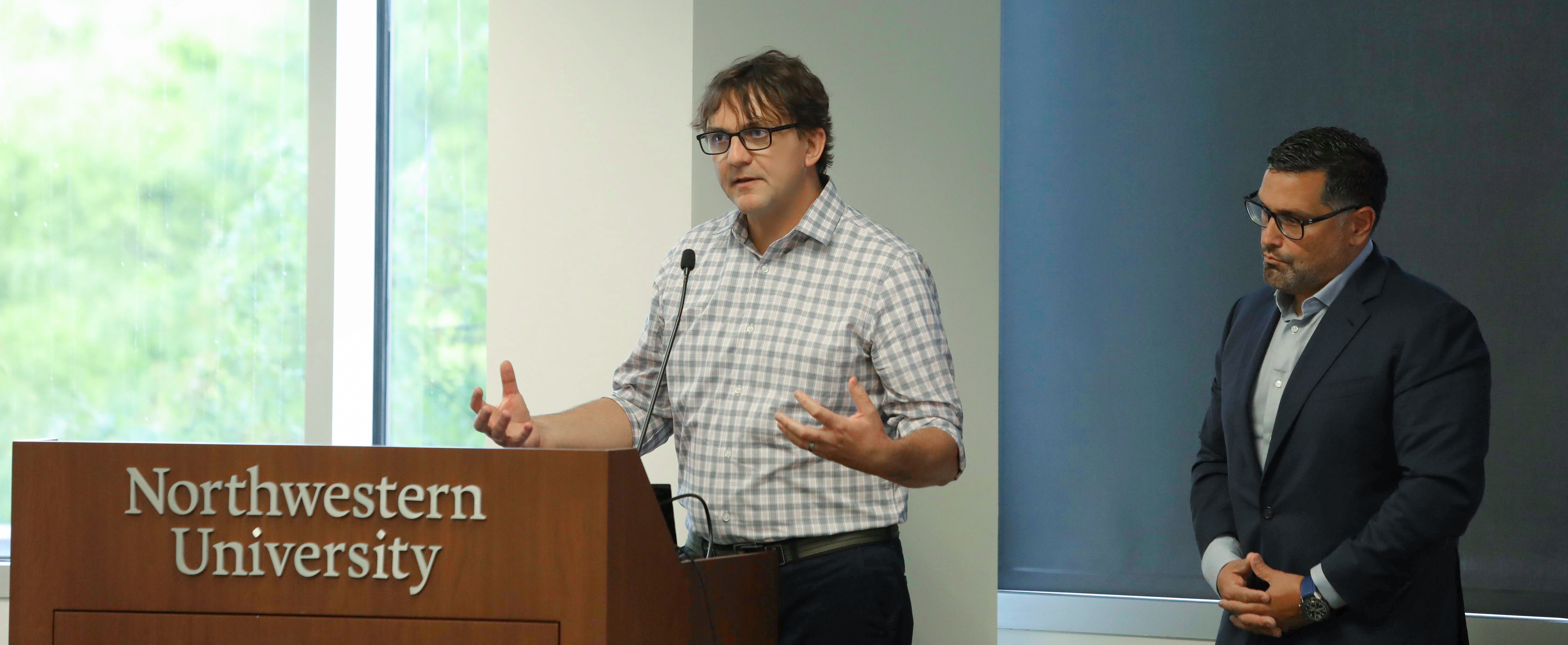Northwestern Buffett Global Working Group launches heat-mapping collaboration with City of Chicago
The Defusing Disasters group aims to identify populations most vulnerable to heat and leverage resources to build community resilience
Two Northwestern faculty members co-lead Defusing Disasters, a Northwestern Buffett Global Working Group: Daniel Horton (left) is Assistant Professor of Earth and Planetary Sciences at the Northwestern Weinberg College of Arts and Sciences and George Chiampas (right) is Assistant Professor of Emergency Medicine and Orthopaedic Surgery at the Northwestern Feinberg School of Medicine.
This summer, two-thirds of North America could face power outages due to shortfalls in the electrical grid. A recent study featured in the New York Times predicted that thousands of deaths would occur if multi-day shortfalls were to happen during heat waves in major U.S. cities. If a blackout lasted two days during a heat wave in Phoenix, for example, and power was restored gradually over the next three days, an estimated 12,800 people could die.
It is clear that climate change is here. Already, the Global Burden of Disease Study estimated that, in 2019, approximately 1.7 million deaths were attributable to acute heat and cold exposure. The World Health Organization has also identified heat stress as one of four key drivers of predicted increases in global deaths caused by climate change over the next few decades.
A new partnership among the Defusing Disasters group based at Northwestern University, the City of Chicago and community-based organizations aims to prepare for this looming reality and prevent thousands of heat-related deaths in Chicago and beyond. The Defusing Disasters group—established through a unique Idea Incubation Process facilitated by Northwestern University’s Roberta Buffett Institute for Global Affairs—includes researchers with expertise in a broad range of disciplines, from emergency medicine and disaster management to Earth and environmental sciences, as well as leaders of government agencies like the Chicago Department of Public Health (CDPH) and the Chicago Metropolitan Agency for Planning.
Through this new partnership, researchers, public health officials, policy advisors, emergency management teams and community partners will leverage data and local knowledge to identify those most vulnerable to extreme heat in Chicago’s communities. This summer, researchers and local community members will begin collecting the data needed to characterize heat vulnerabilities through Chicago's Heat Watch 2023 initiative. Heat Watch 2023 is part of the National Oceanic and Atmospheric Administration (NOAA) Heat Watch Campaign, which aims to help cities across the U.S. identify specific neighborhoods where heat-mitigating interventions could save lives.
With the help of the National Weather Service Chicago Forecast Office, CDPH staff will train and mobilize volunteers on one of the hottest and clearest days of the year to drive with specially designed heat sensors on their cars in the morning, midday and evening on routes informed by the community. Each sensor records temperature, humidity, time and location.
This information will be analyzed by the Defusing Disasters group and give the City of Chicago data they can use to improve the city’s heat safety strategies. Ultimately, the Defusing Disasters group hopes to expand their collaborative approach outside of Chicago and the U.S. to help prevent extreme heat-related deaths globally and encourage collaborative problem solving and knowledge co-creation among universities, local governments and communities groups.
To learn more or sign up to volunteer in Chicago this summer, please visit Heat Watch 2023. No qualifications are necessary. Volunteers will be asked to participate in a training and on a designated “Campaign Day”—a clear, hot and sunny day in mid- to late July—travel routes with provided heat sensors on their own cars for three one-hour sessions during the morning, afternoon and evening. Volunteers can sign up to be drivers or navigators.
In addition, researchers, policymakers and others interested in learning more about innovative initiatives to prevent, adapt to or mitigate the health consequences of extreme heat can register for an upcoming workshop on June 20–21 organized by the National Academies of Sciences, Engineering, and Medicine’s committee on communities, climate change and health equity. Northwestern University Professor Daniel Horton, who co-leads the Defusing Disasters group, is among the experts on the committee.

